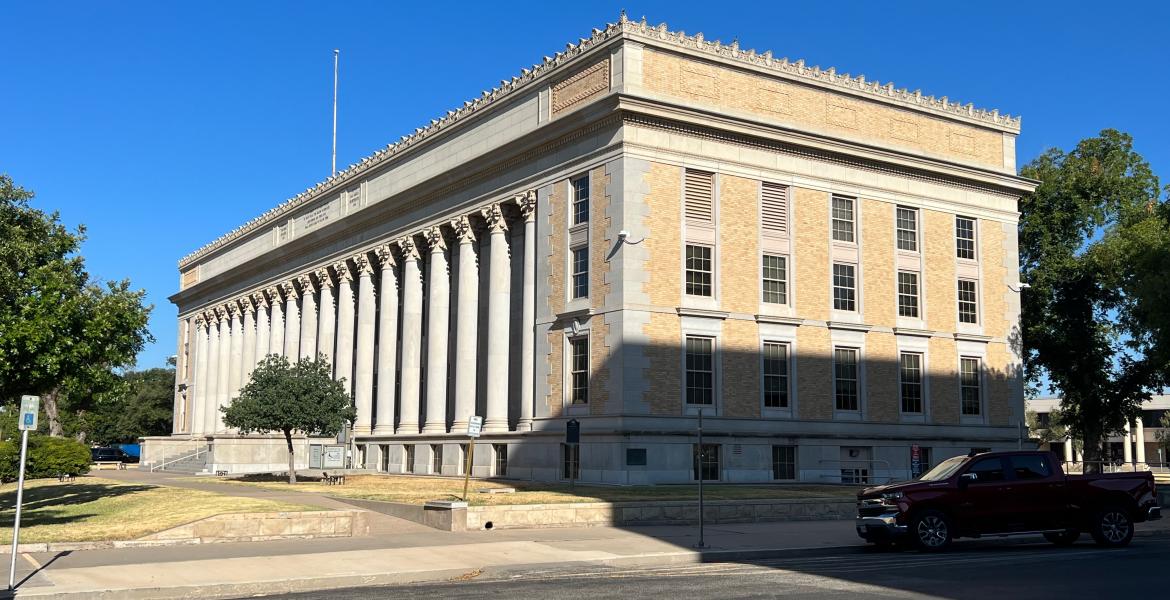The number of abandoned corpses in Tom Green County is on the rise, the city reports, already up to eight this year as opposed to seven in 2013 and none in 2012.
Like indigent deaths, unclaimed bodies and the unidentified, once a family “washes their hands of a body”, cremation becomes a city-county duty, carried out at the taxpayer’s expense.
Recently, rumors circulated of a female body being kept at Johnson’s Funeral Home for nearly three weeks without being embalmed or cremated. The family, rumor had it, couldn’t afford the $2,700 direct cremation—the cheapest form of handling the remains the funeral home offers—and weren’t given any assistance in dealing with their deceased relative. In short, they needed help and weren’t getting it.
While the circumstances of this account couldn’t be corroborated, San Angelo’s Director of Community Development, Bob Salas, says stories like these are a fairly common reality. The problem, he says, is that people often misinterpret the phrase indigent death, substituting the meaning for low-income stipend and assuming that the city will automatically take over the costs.
“It’s a little bit of a misnomer,” Salas said. “People think that it’s a low-income stipend to help bury their family, and it’s not. It is the family’s responsibility to bury their loved ones and their family. The county gets involved when the person has absolutely no money or what’s considered indigent. In the state’s case or in the county’s case, it means 50 percent of…the poverty line is considered indigent.”[[{"fid":"7515","view_mode":"default","fields":{"format":"default","field_file_image_alt_text[und][0][value]":"","field_file_image_title_text[und][0][value]":""},"type":"media","attributes":{}}]]
Fifty percent of the poverty line is an incredibly low sum that is frequently exceeded by social security payments alone. For a two-person household, a combined annual income of $7,755 is the maximum, and even a single dollar over that amount will result in the city-county turning the full cremation or burial responsibilities over to the family.
Assets, life insurance and savings are also taken into account, and before the city-county agrees to assume the duty of cremation, each member of the household at the time of death will be vetted in order to assess financial capabilities.
The county judge has the ultimate authority to decide which cases will be accepted, Salas said, and not all of them operate as strictly as others. “Some county judges are very tough. I’ve heard stories where…one of the judges out in [another county], he would sit at the window and watch. If somebody came up in a car and asked for [indigent cremation], he would say, ‘no, you have a car, you can bury your loved ones’. We don’t go to that extreme, but if they do have assets, we take that into consideration.”
In cases like the aforementioned, some people opt to “abandon the corpse”, or to fully absolve themselves of all responsibility. The state mandates that a county take responsibility for its dead and if a family wants nothing to do with a corpse for whatever reason, they can’t be forced to fund the services. As the population grows, Salas said, so has the number of abandoned bodies.
“What happens a lot of the times, if there’s an abandoned body, we’ll take care of that. It’s happening more and more. We find people and families just abandon the body. They just wash their hands of it and walk away. They do that,” he said, shockingly.
“We have some horrible stories,” he continued. “We had this one lady three years ago that passed away. We found the family…we found the body and then we hunted down a son in North Carolina and we made contact with him, and he basically told me he doesn’t care what you do with that body. He has nothing to do with that person. It was his mom. I’m thinking to myself what could she have done to get that kind of reaction from the son. That’s the kind of stories we get a lot.”
Forfeiture of Rights
Whether or not the abandonment issue is a social or an actual financial problem, Salas said, is difficult to ascertain, however families do forfeit certain rights and privileges when they opt for an indigent cremation.
“I’ve never taken them to task, but if they want our services, they cannot do an obituary,” Salas explained. “It’s part of the program. If they have money for an obituary, they should be able to pay some of that money to the funeral homes to take care of that. We put a [death] notice, but an obituary is really a story about their lives. It is costly and any cost that the county can recoup, they will. If they have life insurance, we will try to recoup from that, too.”
Viewings, memorials and funerals are also off limits for those subject to indigent deaths, and the bodies are exclusively cremated. A casket-type burial is only conducted when the body is unidentifiable and may need to be exhumed later for whatever reason, which would be impossible if cremated.
Once a person has been cremated, the ashes are either given to the family or collected by Fairmount, which retains them until a set of six are ready to be buried in a plot purchased by the city. It can take a while to accrue the necessary six, Salas said, as about 50 percent of the families choose to take the ashes of their loved ones. Once buried, a nameplate is put on the grave for identification purposes. No other services are rendered or permitted by the agreement.
On average, the city-county assumes approximately 15-20 indigent deaths per year, Salas said. The number has changed greatly since he took over in 2006, and the budget has been reduced by roughly 75 percent.
“When I took over the program in 2006…the program was administered a little bit differently,” he said. “They were using the wrong income levels. They were using the low-income levels, not indigent. We used to have like 83 at one time, a year. It was basically a stipend at one point for low-income families.”
Back then, all of the bodies were buried rather than cremated. Nowadays, the city’s funeral homes perform direct cremation only, which costs the city $900 per corpse. In order to figure the budget, the city looks at the numbers and trends in cases from previous years and projects what they’ll need to cover the next. Currently, approximately $25,000 a year is allocated to indigent deaths within the county.
Before an indigent cremation can be executed, a family member must sign off on it. In abandonment cases, county judge Steve Floyd signs off, permitting a funeral home to complete the cremation.
The Corpse Cooler
Reaching an agreement with the city-county can be done relatively quickly if all of the information is available, Salas said, however duration varies case to case and can take time if family members, for example, don’t have a bank account or don’t have their documentation in order.
“We had a guy earlier this year, he lost ID, so it took him three days to find his ID so he could go down there and start the process,” James Campbell, owner of Robert Massie Funeral Home said. “It depends on the family. Some families can go over there and talk to city-county services, go out that afternoon, get everything and take it back the next morning. We’ve had families that have gone over there and they say, ‘oh, here’s what you need, ok’ and then they leave and never go back.”
Identifying the person or the family can also take time, Salas said, thus slowing down the process on both ends.
“Sometimes it takes a long time to find a relative,” he said. “There’s some that will be there for months. We just can’t find a relative.”
Campbell says the goal at Robert Massie is to hold a body no longer than 10 days, and in order to enforce that time limit, the funeral home has a form family members sign, which declares that after X amount of time they are declining the responsibility of making arrangements. If that period is exceeded, it becomes an abandoned body and the county takes over.
Nonetheless, there have been cases where bodies were stored for more than 30-90 days, Campbell said, each cooled in a refrigeration unit with a temperature of 38 degrees or below.
Legally speaking, Campbell said he is unaware of any laws on how long a funeral home can hold a body, however the cause of death and state of decomposition does affect what services can ultimately be offered.
“We held a gentleman that we ultimately buried for more than 90 days,” Campbell recalled. “This gentleman…it turned out that he had houses in the state of Texas under several different names in different towns and bank accounts under different names in different towns. And so they couldn’t find any family members, but while they were doing that investigation we held onto him.”
In 2012, Tom Green County and the city of San Angelo subsidized a total of 9 cremations. That number jumped to 16 in 2013, seven of which were abandoned bodies. So far this year, 19 indigent cremations have been done, eight of which were abandoned.
“The main thing that I would tell families is that it’s very difficult to get approved for city-county,” Campbell said. “If you live by yourself and you make $478 gross a month, you make too much money for the city-county to be able to help you. We get people denied all the time. It may be as high as 50 percent.
“The most important thing is to not put off planning,” he said. “We offer and all funeral homes offer some sort of pre-planned or pre-paid funeral arrangements.”
Information on pricing and services for Robert Massie Funeral Home is available on their website, and the home does accept payment plans tailored to suit the needs of individuals, Campbell said.
Those who wish to take advantage of the county’s indigent cremation services are advised to read the guidelines on the city website.
Subscribe to the LIVE! Daily
Required






Comments
Listed By: George Mann
- Log in or register to post comments
PermalinkListed By: Joe Blow
- Log in or register to post comments
PermalinkListed By: concerned citizen
- Log in or register to post comments
PermalinkListed By: Chelsea Reinhard
The way the city-county cost was explained to me was that competing funeral homes submit a price to the city for the cost of the cremation. The city then picks the lowest one and all the other funeral homes fall in line to offer the same service at that price. The reasoning, I assume, is quantity. It's like going to Sam's Club. If you buy 40 rolls of paper towels, you'll get those cheaper than buying each roll individually. The city-county is responsible for the cremations of all qualifying indigent deaths of residents within the county, which ranges from 15-20 per year and is on the rise.
Further, Mr. Campbell from Robert Massie explained that there are always cases in which a family does not qualify for the city-county services, but nonetheless cannot afford to do it themselves. In these circumstances, they either abandon the body and forfeit all rights--such as obituaries, viewings, etc--or they work something out with the funeral home, be it a reduced rate or a payment plan. The funeral home is not required to meet such agreements, but ultimately tries to work something out with people who have less money available, he said.
- Log in or register to post comments
PermalinkListed By: George Mann
- Log in or register to post comments
PermalinkListed By: Red Neck
- Log in or register to post comments
PermalinkPost a comment to this article here: